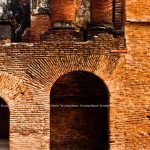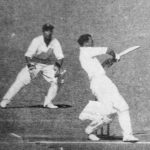The Origin of “Bazaar”
and Revisiting Some Fascinating Ones
The idea of a bazaar, as a fixed and permanent place for buying and selling goods in villages, towns and cities, originated in ancient Islamic civilization. Initially, trading used to take place only along the important trade routes between the countries as well as within the Countries, when the weather allowed. Eventually, special areas were allocated in cities as trade centers and they came to be known as “Bazar”. Etymologically, the word bazar goes back to Pahlavi (Middle Iranian, 250 BC) word, “Baha- char”, meaning: ‘the place of values or prices’. The Urdu word “Baazaar” is the same as Persian “Bazar” with a slight change in spelling and pronunciation. During the occupation of Spain by Moors for around seven hundred years, the idea of a bazar gained popularity and along with a lot of other vocabulary, the word bazaar was also assimilated in different European languages with different spellings and pronunciations and sometimes as a different word. For instance, in Italian it came to be known as “Bazzara”, in Spanish: “Feria”, in Portuguese: ” Mercado”, in Swedish: ” Marknad”, in German: ” Basar” in Turkish: ” Pazar”, in Greek: ” Ayopa “, in Arabaic: “Souq” and in English: ” Bazaar”.
In some cultures, a bazaar means a charity market where people donate goods to be sold and the benefit goes to some cause. In Geneva, the United Nations ‘Women’s Guild has an international charity bazaar every year held in the Palais des Nations (U.N. headquarter). In the Western world, some bazaars, which sell used, old and cheap items at low prices came to be known as “Flea markets” whereas bazaars selling used, old but precious items at higher prices became known as “Antique” bazaars. Gradually, bazaars changed their character by not just remaining a place for buying and selling goods but also providing entertainment of various sorts, and for socializing in cultural and religious activities as well. Places of worship, restaurants, Tea and coffee houses appeared in or near the bazaars. Initially, the bazaars were in the open air only but gradually, they became covered as well, which were convenient in all weathers. Modern shopping malls and supermarkets are the evolved forms of earlier bazaars.
In Lucknow, the Nakhas bazaar in old city is believed to be about 200 years old. I used to pass through only the Sunday bazaar in Nakhas in my childhood. Once a month on a Sunday, we used to visit a great aunt who lived in Billauchpura. The Nakhas bazaar happened to be en route. It was a real treat, at least for me, to pass through the whole length of this bazaar. I had never seen such a mass of humanity, so many shops selling such a variety of things, as well as some domestic animals and colorful birds. Some Parrots and Mainas screaming away, incessantly repeating the words they were made to memorize by their owners to attract customers: “Tashreef laaiye, Tashreef laaiye, Tashreef…” was the only one I remember. There were snake charmers, bandariya ka naach (monkey’s show), cockfights, peddlers, magicians, fortunetellers, hawkers of all kinds and what not! How I wanted to jump out of the Tonga and mingle with the crowd but had no courage to do so. The whole month I used to look forward to the Sunday when we had to go to Billauchpura to enjoy the feast of my favourite goodies at the destination as well as for a feast to my eyes en route. But for a long time, my experience of Nakhas bazar remained limited to once a month Sunday bazaar only and that also sitting in a moving Tonga. As this bazaar was very far from where we lived, we never went there for any other shopping, except on the occasion of weddings, women went there to buy jewellery, fancy fabrics, silver utensils etc. As I grew older, I learned about some other spots and activities in Nakhas bazaar, which I was not aware of as a child. For instance, Nakhas also accommodates the famous “Farangi Mahal” the place from where very enlightened Islamic scholars as well as scholars in other fields came from. Some great Urdu poets and writers also lived in and around Nakhas. Nakhas also had the “Red-light- area” of Lucknow. I heard that the “Kothaas” above the shops, used to come alive in the evenings with ” Mujras ” in progress. Those whose pockets or morals did not allow visiting the kothas were free to take a stroll on the road below and enjoy a symphony of Tabla, Sitar, Sarangi and Ghungroos (anklets with tiny bells) accompanied by a “Thumri” being rendered in a melodious voice. How I also wanted to take a stroll there at least one evening but- not a chance.
The mention of Nakhas and its kothas always brings back memory of an interesting story narrated to us by a family friend, Meesam “Parwana” Rudaulvi. According to him, a certain Syed of Lucknow, an astute politician, during campaigning for his election, went to Nakhas and to kothas as well to ask for votes. He promised them to improve living conditions in their area after winning. The Syed received overwhelming support from the inhabitants of Nakhas and won. But after the victory, like all other politicians, he also forgot his promises. Obviously his supporters were disappointed and complaining. “Parwana” Rudaulvi was editor of an Urdu paper in Kanpur at that time and to voice complaints from Nakhas, he gave the following amusing headline in his paper: “Aaye Na Syed Vaada Kar Ke”. Meesam used to visit us when his close friend Shoeb who was my first cousin, was staying with us in Lucknow. After narrating the Syed story, Meesam recited the line: ” Aaye na Syed Vaada Kar Ke” in not a very melodious voice but making funny gestures of a Mujra! It was hilarious! My mother who knew him since his childhood in Rudauli, as the naughtier of the twin boys, was very fond of him and we used to look forward to his visits with his amusing stories. He was one of the wittiest Rudaulvis.
Time passed. I married and left India before getting to know the Nakhas bazaar well. We lived in a number of countries and when in Ottawa, Canada, I was reminded of Nakhas bazaar through a very unexpected and unusual source. I was teaching ESL at the University of Ottawa and went to attend a conference in Applied Linguistics at McGill University in Montreal. There I looked for Professor Barker whose books on phonetics I had seen. He was teaching Urdu there and was also a professor in Islamic studies. He told me he had spent some time in Lucknow to polish his Urdu. His acquaintances in Lucknow suggested to him to go to Nakhas in old Lucknow, converse with the shopkeepers and get practice in speaking good Urdu. So he started going there regularly and on a Sunday, discovered the Sunday bazaar which he called a “Flea Market “as he did not see anything of value there. (The valuable things had already disappeared by this time.). But one Sunday, digging into a pile of “Junk”, he found a treasure that he could not believe his own eyes or luck. It was a hand-written copy of the Quran, badly tattered! He was able to read some Arabic because of his familiarity with Urdu script. He asked the “Kabadia” for its price and the illiterate man apologetically replied: ” Huzoor, itni phatee-purani kitaab ke kya daam bataoon, lekin ghareeb aadmi hoon chahiye to paanch (5) Rupiye baksh deejiye”! Professor Barker was flabbergasted! A hand- written Quran (in whatever condition) in five rupees? He was a lover of books and knew the intrinsic value of them. His conscience did not allow him to get this very special find at such a low price. He would have given fifty thousand rupees for it if he had the money but he was only a student. So he gave the man the best he could afford and that was fifty rupees and for which he received a “Furshi “salaam from the poor old Lakhnavi.
The precious book prompted Professor Barker, a linguist and a scholar, to learn Arabic so he could read and understand the Quran in original. Eventually, he converted to Islam and lived as a devout Muslim. Professor Barker’s precious find incited me to visit Nakhas’s Sunday bazaars on my annual visits to India. But I never had the good luck of the Professor. My only gain was that I came to know Nakhas better. I discovered a very old bookshop at the corner of Nakhas Road and Rakab Ganj Road? Owned by an unassuming gentleman who appeared an institution in himself. He was an embodiment of old Lakhnavi tehzeeb. It was fascinating to talk to him. He seemed to know all past and present Urdu poets and writers. You name the person and he would tell you all about him. But his bookshop was a big junkyard of heaps of books yellowed with age and covered with dust. I asked him if he had certain old books, which I had been looking for but for each of those books he remembered that somebody borrowed them from him and never returned! Sounds familiar? He dug out some other classics for me but I already had a copy of them. It was surprising to see that he knew exactly where every book was in his shop. Nobody else could find what one was looking for. Two or three years ago on my annual visit to Nakhas, I was grieved to find that the gentleman and the stacks of his dusty books were not there anymore, only the empty shop was still there. It had to happen one day and, unfortunately, it happened soon after I reached this very unusual place. I wonder if anybody ever interviewed him or made a documentary on him? I returned to the spot again last year, this time only to buy my favourite “Kali Gajar ka halwa” from the Halwai shop opposite the book shop and lamented at the ruins of what was once a house of treasures.
This time in Nakhas, I also discovered some fabric shops, which had space for parking nearby which rarely happens in Lucknow these days. So it appeared a more convenient place for shopping than Aminabad. I also noticed that the shopkeepers still observed old Lakhnavi tehzeeb. I was particularly touched when after doing some shopping, I discovered that I did not have enough cash on me to pay for the fabrics I bought as I am more used to paying by credit card now. I asked the shopkeeper whose name was Aizaz to keep my shopping aside and I’ll pick it up the next day. But I was taken aback when he said “Arey Aapa, aap aaj hi le jaaiye jab agli dafa aaiega to paisay de dijiyega.” I was at his shop for the first time and he did not even know my name or address. I thought such trust between fellow human beings was extinct! Thanks to Nakhas bazaar that I started looking for Flea Markets and Antique Bazaars in every country I lived in or visited. In some countries, I had better luck in finding some precious books as well as other items than in our own Nakhas bazaar. The list is long though fascinating but I leave it for another time.
Dr. Sehba Ali
Writer is an Applied Linguist and a freelance-writer.
(Published in The Lucknow Observer, Volume 2 Issue 20, 5th November 2015)




